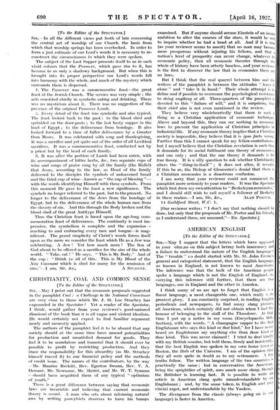CHRISTIANITY, COAL AND COMMON SENSE
[To the Editor of the SPECTATOR.] Sin,--May I point out that the economic proposals suggested in the pamphlet Coal : a Challenge to the National Conscience are very close to those which Mr. J. St. Loe Strachey has expounded in the Spectator ? Yet a reader of the Spectator•, I think, would gather from your reviewer's good-natured dismissal of the book that it is all vague and violent idealism. He would certainly not expect to find familiar argument newly and earnestly applied.
The authors of the pamphlet feel it to be absurd that any society should at the same time have unused potentialities for production and unsatisfied demand for goods. They feel it to be scandalous and immoral that it should ever be possible to profit by restricting production. And they trace the responsibility for this absurdity (as Mr. Strachey himself traced it) to our financial policy and the methods of credit issue. The names of the contributors, by the way ----Mr. Maurice Reckitt, Rev. Egerton Swarm, Rev. V. A. Delmont, Mr. Newsome, Mr. Mairet, and Mr. W. T. Symons --should have acquitted them of any typical " optimism of youth."
There is a great difference between saying that economic laws are invariable and believing that current economic. theory is sound. A man who sets about reforming natural aws by writing pain phlets deserves to have his bumps
examined. But if anyone should accuse Einstein of an insane ambition to alter the courses of the stars, it would be well to inquire whether he had a head at all. . And if it is true (as your reviewer seems to assert) that no man may become more prosperous without injuring his fellows, and that a nation's level of prosperity can never change, whatever its economic policy, then all economic theories through the whole of history have been utterly baseless, and your reviewer is the first to discover the law that in economics there are no laws.
But I think that the real quarrel between him and the writers of the pamphlet is between the attitudes `,` leave it alone " and " take it in hand." Their whole attempt is to define and if possible to overcome the psychological resistance to doing anything at all. Three-quarters of the pamphlet is devoted to this " failure of will," and it is surprising that their chief aim is not even mentioned in the review.
They believe very wholeheartedly that there is such a thing as a Christian application of economic technique. Above and beyond this, they can see nothing in economic laws to prevent the application of Christian principles to industrial life. If any economic theory implies that a Christian society is impossible, they believe that it is ipso facto wrong. Further than this I cannot speak for my fellow-contributors; but I myself believe that the Christian revelation is such that it demands for its social fulfilment one theory of economics, and one only ; and that the one theory it demands is the true theory. It is a silly question to ask whether Christianity alters the " thing-in-itself " ; it does not alter, it reveals. If this be so, the Bishop of Gloucester's denial that there is a Christian economics is a disastrous confusion.
I am sorry that your reviewer, could not commend the pamphlet more seriously to your readers. It was the Spectator which first drew my ownattention to " Berkeleyan economies," and I should still wish to call myself a follower of Berkeley in these realms.—I am, Sir, &c., AL Pols•ren. 14 Guildford Street, W.C. 1.
[Our reviewer writes : " I don't say that nothing should be done, but only that the proposals of Mr. Porter and his friends, as I understand them, are unsound."—En. Spectator.]


































 Previous page
Previous page